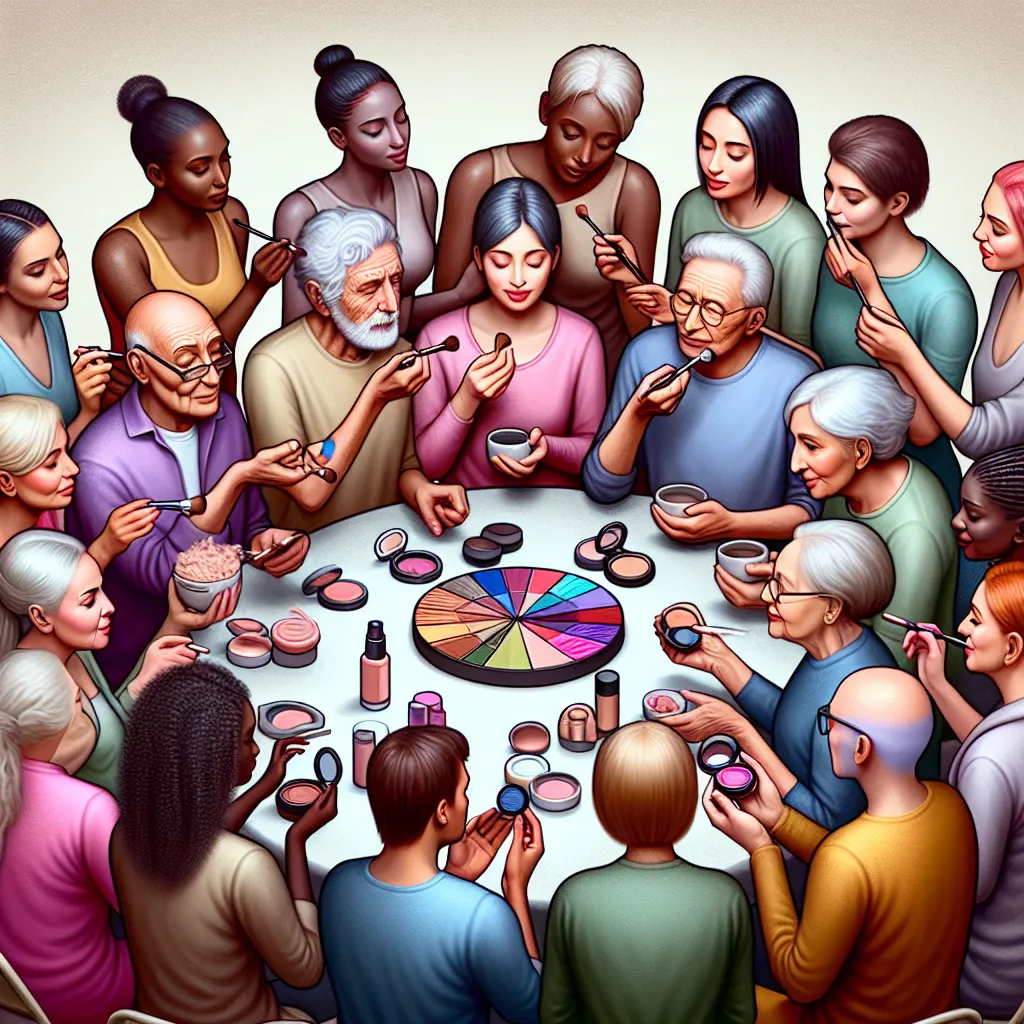– The Science of Beauty: Understanding the Psychology of Makeup
When it comes to the science of beauty and the psychology of makeup, one cannot overlook the impact of products like cream blusher. Cream blushers have a unique way of enhancing the natural glow of the skin, creating a youthful and radiant appearance. The application of cream blusher not only highlights the cheekbones but also influences the perception of facial symmetry, which has long been associated with attractiveness.
Research in the psychology of makeup suggests that the use of cream blusher can affect an individual’s self-perception and confidence. The subtle changes in facial coloration brought about by cream blusher can contribute to a person’s overall appearance and, consequently, their self-esteem.
Furthermore, the choice of cream blusher and how it is applied can reflect an individual’s personality and style. Whether opting for a natural, barely-there look or a bold, statement-making appearance, the selection of cream blusher becomes a form of self-expression.
Understanding the psychology behind the use of cream blusher provides insight into the deep-rooted connection between makeup and self-image. To explore a range of cream blushers, you can visit cream blusher for a variety of options to suit your preferences.
– The Science of Beauty: Understanding the Psychology of Makeup
Makeup has been a significant part of human culture for centuries, and its psychological impact goes far beyond the surface. The science of beauty delves into the understanding of how makeup affects the psychology of individuals. Research has shown that wearing makeup can boost self-esteem and confidence. This psychological effect is known as the “lipstick effect,” where wearing makeup is linked to increased feelings of attractiveness and self-assurance.
Furthermore, the application of makeup can also influence how others perceive an individual. Studies have demonstrated that both men and women view women wearing makeup as more competent and trustworthy. This phenomenon highlights the social implications of makeup and how it can alter perceptions and interactions in various social and professional settings.
Moreover, the act of applying makeup can have therapeutic effects, serving as a form of self-expression and artistry. Many individuals use makeup as a means of creativity and personal transformation, enhancing their mood and outlook on themselves. This aspect emphasizes the emotional and psychological significance of makeup beyond its aesthetic enhancements.
In conclusion, the psychology of makeup encompasses a multitude of factors, from its impact on self-esteem and social perception to its role in self-expression and emotional well-being. Understanding the science behind beauty and makeup provides insight into its profound influence on individuals and society as a whole.
– Beyond the Surface: Unveiling the Psychological Impact of Cosmetics
In today’s society, makeup is often seen as a way to enhance one’s physical appearance. However, beyond the surface level, the use of cosmetics has a profound psychological impact on individuals. Research has shown that the act of applying makeup can have a significant influence on a person’s self-esteem and confidence. It serves as a form of self-expression and can empower individuals to present themselves in a way that aligns with their inner self.
Moreover, the use of cosmetics can also affect the way others perceive an individual. Studies have demonstrated that makeup can alter people’s perceptions of attractiveness, competence, and trustworthiness. This highlights the intricate link between makeup and social interaction, as well as the psychological implications of these perceptions.
Additionally, the ritual of applying makeup has been found to have therapeutic effects, providing individuals with a sense of control and soothing anxiety. It can also act as a daily self-care practice, promoting mindfulness and boosting overall well-being.
Understanding the psychological impact of cosmetics takes us beyond the surface level and sheds light on the complex relationship between makeup, self-perception, interpersonal dynamics, and emotional well-being. By delving into this multifaceted subject, we gain a deeper appreciation for the transformative power of makeup beyond its outward aesthetic effects.
– Makeup Unveiled: Exploring the Emotional and Mental Effects
Makeup holds a powerful transformative ability, not just in the physical sense, but also in its emotional and mental effects. The act of applying makeup can be a form of self-expression and empowerment, allowing individuals to enhance their features and boost their self-confidence. Research in psychology has shown that the ritual of applying makeup can have a significant impact on one’s mood and self-perception.
Beyond the surface-level enhancements, makeup serves as a tool for self-care and self-expression. Many individuals find the process of applying makeup to be a meditative and soothing practice, providing a sense of control and creativity. The act of taking the time to focus on oneself and engage in a grooming ritual can have a calming effect on the mind, reducing stress and anxiety.
Furthermore, the psychological effects of makeup extend to the way it influences how individuals are perceived by others. Studies have indicated that wearing makeup can lead to positive social perceptions, with individuals being viewed as more competent, likable, and attractive. This can, in turn, reinforce a person’s self-esteem and social confidence, creating a positive feedback loop.
On the flip side, the reliance on makeup for self-esteem and confidence can also have its pitfalls, potentially leading to a dependence on external appearance for validation. It’s important to strike a balance and remember that true beauty comes from within.
Exploring the emotional and mental effects of makeup unveils its multifaceted nature, showcasing its ability to empower, uplift, and transform. Understanding the psychology behind makeup sheds light on its profound impact on the human psyche, reminding us that beauty goes beyond the surface, influencing our emotions and perceptions in profound ways.
– Beauty Enhancer or Mask: Delving Into the Psychology of Makeup
Makeup has been a significant part of human culture for centuries, serving as a tool for enhancing beauty and self-expression. However, the psychological implications of wearing makeup extend beyond mere aesthetics, delving into the complex interplay between self-perception, societal norms, and personal identity.
For many individuals, makeup serves as a beauty enhancer, boosting confidence and creating a sense of empowerment. Research has shown that wearing makeup can positively influence self-esteem and self-perception, leading to a greater sense of attractiveness and overall well-being. The act of applying makeup can also be a form of self-care and self-expression, allowing individuals to present themselves in alignment with their internal identity and mood.
On the other hand, makeup can also be perceived as a mask, prompting discussions about authenticity and societal pressures. Some argue that the widespread use of makeup can perpetuate unrealistic beauty standards, leading individuals to feel inadequate without it. Additionally, the reliance on makeup to conceal perceived flaws may contribute to a diminished sense of self-acceptance and perpetuate feelings of insecurity.
It is essential to recognize that the relationship individuals have with makeup is deeply personal and can vary widely. While some may view it as a tool for self-expression and confidence, others may struggle with feelings of dependence and self-doubt. Understanding the psychology of makeup involves acknowledging the diverse motivations and perceptions surrounding its use, ultimately highlighting the nuanced interplay between beauty enhancement and the complexities of self-image.
By delving into the multifaceted psychology of makeup, we can gain a deeper understanding of how it shapes individual experiences, influences societal perceptions, and reflects broader cultural ideals. Ultimately, this insight can pave the way for more inclusive and empowering conversations surrounding beauty, self-expression, and the diverse ways in which individuals navigate their relationship with makeup.

